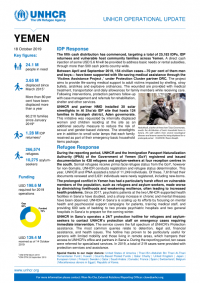Yemen: UNHCR Operational Update, 18 October 2019
IDP Response
The fifth cash distribution has commenced, targeting a total of 25,183 IDPs, IDP returnees and vulnerable host community families across Yemen. A direct cash injection of some USD 5.6 M will be provided to address basic needs or rental subsidies, through more than 500 cash points country-wide.
Between April and September 2019, 154 civilian cases—70 per cent of them men and boys— have been supported with life-saving medical assistance through the ‘Victims Assistance Project ,’ under Protection Cluster partner DRC. The project aims to provide life-saving medical support to adult victims impacted by shelling, stray bullets, airstrikes and explosive ordnances. The wounded are provided with medical treatment, transportation and daily allowances for family members while receiving care. Following interventions, protection partners follow-up with case management and referrals for rehabilitation, shelter and other services.
UNHCR and partner NMO installed 30 solar streetlights in Al Sha’ab IDP site that hosts 124 families in Buraiqeh district, Aden governorate. This initiative was requested by internally displaced women and children residing at the site as an additional security measure to reduce the risk of sexual and gender-based violence. The streetlights are in addition to small solar lamps that each family received as part of their emergency basic household items package.
Refugee Response
During the reporting period, UNHCR and the Immigration Passport Naturalization Authority (IPNA) of the Government of Yemen (GoY) registered and issued documentation to 438 refugees and asylum-seekers at four reception centres in the south. Somali refugees receive prima facie refugee status from the GoY, however for non-Somalis, UNHCR conducts registration and refugee status determination. This year, UNHCR and IPNA assisted a total of 11,249 individuals. Of these, 7,618 had their documents renewed and 3,631 individuals were newly registered, including new-borns.
The prolonged conflict in Yemen has had a particularly harsh effect on vulnerable members of the population, such as refugees and asylum-seekers, made worse by diminishing livelihoods and weakening resilience, often leading to increased health problems. Since 2017, psychiatric patients at the two UNHCR-supported health facilities in Sana’a have doubled, and a sharp increase in chronic and mental illnesses have been observed. UNHCR in Sana’a is scaling up its efforts by focusing on mental health and psychosocial support campaigns for patients, training medical staff, and providing 600 sets of bedding to two private psychiatric hospitals and two general hospitals in Sana’a to prepare for the coming winter.
UNHCR in Sana’a operates a 24/7 protection hotline for refugees and asylumseekers to contact UNHCR’s protection staff on emergency cases requiring immediate intervention. The service covers the full spectrum of UNHCR’s Protection assistance. The most common queries relate to detention, legal aid, financial assistance, and health issues. The hotline has proven to be particularly useful for persons with limited mobility and those living in remote areas, which hampers their access to UNHCR’s office and partners in Sana’a. During the reporting period, ten cases were referred for specialised services. In 2019, a total of 219 cases were provided with protection services and assistance.
https://reliefweb.int/report/yemen/yemen-unhcr-operational-update-18-october-2019-0

